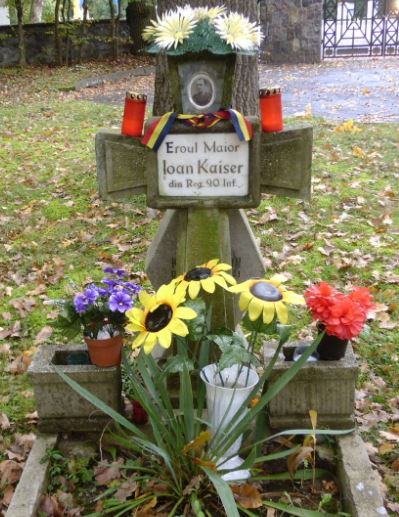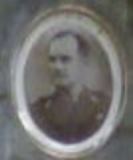Kaiser, Ioan (Regimentul 90 infanterie)
- Date of birth:
- December 12th, 1903 (Bucharest, Romania)
- Date of death:
- October 10th, 1941
- Nationality:
- Romanian
Biography
Major Kaiser Ioan is one of the Romanian citizens, belonging to the Saxon national minority, who embraced the arms career and participated in the battles carried out by the Romanian army in World War II, for the liberation of the abducted territories and the restoration of Greater Romania.
Born from a family as modest, as distinguished. Here, primary school courses follow, then the Evangelical High School in Bucharest. Distinguished student, with a beautiful vocation for the military career, enters in 1926 in the Preparatory School of Active Infantry Officers no. 1 Bucharest, which, after 2 years, ends with distinction, being ranked 7th among the 360 graduates. of the promotion of officers "General Dragalina", being advanced to the rank of second lieutenant on July 1, 1928, when it was assigned to the 21st Infantry Regiment.
From November 1, 1930 until October 31, 1931, he attends the Special Infantry Schools Sibiu, and at the end of the course, returns to the unit of origin, occupying the position of platoon commander, is advanced to the rank of lieutenant and moved within the cadres. active at the Preparatory School of Active Officers Bucharest.
On October 1, 1932, on request, he was transferred to the Sibiu Infantry Officers' School, where he carried out, in succession, several functions, among which, that of platoon commander, firing officer, inspector of studies, officer with library, officer with supply and teacher of the shooting course, during which time he was promoted to captain.
He had a good collaboration with the library ASTRA, which donated to the libraries of the Military School of Active Infantry Officers "Prince Carol" a significant number of school textbooks and books of literature.
Also in Sibiu, on March 20, 1933, he married Rozalia Biro, the one he had known since he was a student at the Special School.
On April 1, 1938, he was transferred to the 90th Infantry Regiment Sibiu, in the position of supply officer, and from November 1 of the same year he was appointed as commander of the 1st infantry company, then commander of the 12th machine guns company. In this unit, he worked in particular, preparing the concentration of the 1939 contingent, as well as the short-term military.
In September 1941, the 90th Infantry Regiment moved on the Eastern Front, acting against the enemy who defended in particular the direction of Dalnic - Odessa - Sevastopol, entering the fight for the occupation of Dalnic. To occupy this foothold of the enemy, which was very well defended, the regiment carried out a reconnaissance and combat research on October 10, 1941, with the value of an infantry company, reinforced with a machine-gun platoon and supported by artillery, with the mission to take possession on the western edge of Dalnic. At the start of the attack, the company soldiers met with heavy fire from the enemy, especially from the flanks, executed by machine-gun nests, which led to the attack being slowed down and even stopped. Captain Ioan Kaiser observed this and found that following the explosion of a bomb, a machine gun piece was dropped from the fight, killing the commander and the servant, and most of the platoon was lying dead and wounded, leaving the pieces without ammunition. In this situation, Captain Kaiser shot like an arrow from the ditch of the main line, former base of departure to attack, he took two boxes with cartridges, slipped through the enemy rain of bullets to one of the pieces removed from the battle. There, he replaced the shooter and opened fire on enemy machine-gun nests that were firing from the flank. Thanks to the firepower of the machine-gun, he harvested the enemy who was hindering the advancement of the company. But in the midst of the battle, an enemy bullet pierced the captain's head. For his acts of arms he was decorated with the Romanian medals "Man and Faith" and "Cross of the Faithful Service".
After resuming the advance to Odessa, Captain Kaiser was found dead with his head resting on the machine gun. For the example of bravery he was posthumously awarded the Order "Mihai Viteazul" and promoted to Major.
Initially, Captain Ioan Kaiser was buried in the Heroes Cemetery of the 90th Infantry Regiment, in the Frudetal commune near Dalnic, then repatriated and buried in the Heroes Cemetery in Dumbrava Sibiului.
Here, in this cemetery, next to the tomb of the hero Kaiser Ioan we also find other heroes' graves, among them colonel Popa Petre, commander of the 90th Sibiu Infantry Regiment and Lt. (r.) Paul Mihu Sadoveanu, fallen in the battles of September 11th. 1944, on Mureşul Mijlociu near Cheţani, as well as the graves of 14 heroes, from the same unit.
Do you have more information about this person? Inform us!
- Period:
- Second World War (1939-1945)
- Rank:
- Hauptmann (Captain)
- Unit:
- Regimentul 90 infanterie Sibiu
- Awarded on:
- July 16th, 1942
Royal Decree no. DR2040, dated 16th July 1942.
Awarded posthumously.
- Period:
- Second World War (1939-1945)
- Rank:
- Maior
- Unit:
- Regimentul 90 infanterie Sibiu
- Awarded on:
- October 1941
- Period:
- Second World War (1939-1945)
- Rank:
- Maior
- Unit:
- Regimentul 90 infanterie Sibiu
- Awarded on:
- October 1941






